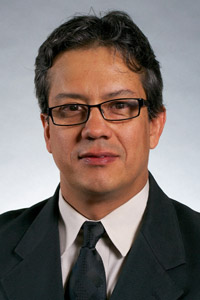Workshops
The Workshops organized by the Institute for Public Economics contribute to the dissemination of academic research on economic and legal institutions among economic and non-economic audiences. This component supports the Institute's mission.
PREVIOUS WORKSHOPS
May 2023
- Speaker: Laurel Wheeler, Department of Economics, University of Alberta
- Title: Beyond Conventional Models: Lending by Native Community Development Financial Institutions
- Date: Monday May 8, 2023 at 4:00 pm
- Location: 1-093 Tory Building
WORKSHOP DESCRIPTION:
Native Community Development Financial Institutions (Native CDFIs) have become an increasingly important source of credit and financial services in Native American communities. This talk presents evidence from a series of papers examining the operations of Native CDFIs. The first paper finds that, in terms of predicting loan outcomes, the unconventional models of risk assessment employed by Native CDFIs (e.g., character-based lending) may be more effective than conventional models (e.g., credit score-based lending). The second paper finds that Native CDFI training of clients with low credit scores mitigates loan repayment failure. The third paper conducts a qualitative analysis of data from focus group interviews with leaders of Native CDFIs, highlighting challenges and opportunities. Taken together, this body of work sheds new light on the practices adopted by Native CDFIs to serve Native communities in historically underbanked areas.
ABOUT THE SPEAKER:
Laurel Wheeler is an applied microeconomist with research interests in development and labor economics. She holds a Ph.D and an MA in economics from Duke University, an MSc in economics for development from the University of Oxford, and a BA in political science from the University of Florida. Laurel Wheeler currently holds a research fellowship at the Center for Indian Country Development (CICD) at the Federal Reserve Bank of Minneapolis. Laurel Wheeler's current research agenda focuses on Indigenous economic development, wealth and income disparities, and labor markets in low-income countries.
April 2023
- Speaker: Professor Ashantha Ranasinghe, Department of Economics, University of Alberta
- Title: Female entrepreneurship, distortions on production and economic development
- Date: Monday April 24, 2023 at 4:00 pm
- Location: 1-093 Tory Building
WORKSHOP DESCRIPTION:
Women account for a small share of all entrepreneurs and a smaller share of market sales among producers. These patterns are also negatively related to the level of economic development. I interpret these facts in a standard macroeconomic framework where business owners differ in their innate ability and also in the distortions on production they face. Based on firm-level data spanning a range of development, an implication is the low female market shares is more a story about women facing higher distortions, specifically on capital, than one about differences in ability. When women face the same distortions as men, there is a substantial increase in the share of female entrepreneurs, the average size of female operated firms and their market shares, with the largest impacts in poorer countries.
ABOUT THE SPEAKER:
Ashantha Ranasinghe is an Associate Professor in the Department of Economics at the University of Alberta. Ashantha's research interests are in macroeconomics, specifically issues related to growth and development.
March 2023
- Speaker: Professor Andrew Leach, Department of Economics and Faculty of Law, University of Alberta
- Title: How much does the world need Canadian oil and gas? The oil sands and LNG in a climate-constrained world.
- Date: Monday March 13, 2023 at 4:00 pm
- Location: Tory Breezeway 1
WORKSHOP DESCRIPTION:
You've seen the ads telling you that Canada's oil sands industry is stepping up to lower emissions and fight climate change. You're told this is a safe bet because the world will continue to use oil and gas. You might have been scolded for questioning this, and perhaps had it pointed out to you that your phone and your toothbrush are made from oil products. But, when it comes to climate change, what is our oil industry really betting on? Not the continued consumption of oil, but the continued willingness to pay a high price for oil and gas and, arguably, increasing consumption of oil and gas year-over-year. Neither of these are, by any means, guaranteed in a world acting on climate change. In fact, both are decidedly less likely than the alternatives. Analysis of global energy markets in a world acting on climate change suggests that large decreases in global oil consumption and real-dollar oil prices are likely to accompany global action on climate change. Yes, the world is still using oil in this scenario, but that doesn’t insulate us from the magnitude of disruption that such a change in global oil markets would portend.
ABOUT THE SPEAKER:
Andrew Leach is an energy and environmental economist and is a Professor jointly appointed to the Department of Economics and the Faculty of Law at the University of Alberta. He has a Ph.D. in Economics from Queen’s University, and a B.Sc (Environmental Sciences) and M.A. (Economics) from the University of Guelph, and an L.L.M. (Constitutional Law and Climate Change) from the Faculty of Law at the University of Alberta. His research spans energy and environmental economics with a particular interest in energy and climate change policies.
November 2022
- Speaker: Professor Jack Stecher, University of Alberta, Alberta School of Business - Department of Accounting and Business Analytics
- Title: Borrower defaults arising from coordination failure, bad luck, and strategic default
- Date: Thursday November 3, 2022 at 4:00 pm
- Location: Tory 2-99
WORKSHOP DESCRIPTION:
The economic consequences of possible default in credit markets are central to the research programs of this year's Nobel laureates in economics. A solvent but illiquid borrower may be forced into default if lenders seize collateral rather than roll their debts over. This form of default is a coordination failure, arising in settings such as sovereign debt crises and bank runs. Default may also arise because of borrower insolvency, or because a solvent borrower, knowing that verification is costly, declares bankruptcy strategically by pretending to be unable to repay debts. The possibility of strategic default affects access to borrowing, and can have important macroeconomic consequences through the financial accelerator. This talk will discuss these causes for default, and will investigate possible ways to reduce their likelihood.
ABOUT THE SPEAKER:
Jack Stecher is a Winspear Associate Professor, Alberta School of Business, Department of Accounting and Business Analytics. He has a Ph.D. from the University of Minnesota and a bachelor's degree from the University of Pennsylvania. Before coming to the University of Alberta, he was at Carnegie Mellon University in Pittsburgh, Pennsylvania, and NHH in Bergen, Norway. Jack Stecher's research is primarily focused on the effects of information and disclosure on capital markets and private debt, with additional interest in more general questions related to decision-making under risk and uncertainty. His research collaborations span numerous academic disciplines, including grants from finance and cognitive neuroscience. He has published in top accounting and business journals and economics, operations research, computer science, and analytical philosophy.
March 2022
- Speaker: Professor Chetan Dave, University of Alberta, Department of Economics
- Title: Large But Rare Shocks to Aggregate Economies
- Date: Monday March 7, 2022
- Location: BUS 1-09
- Link to the recording of the presentation
WORKSHOP DESCRIPTION:
National economies experience large movements in key variables (such as GDP, asset prices and housing prices) on a surprisingly frequent basis: large but rare events. Explaining causal mechanisms behind such movements is a central task in quantitative macroeconomics. In this workshop, Professor Chetan Dave will discuss a stream of research that addresses various causal mechanisms: insufficient learning from the past leading to an all too human tendency to repeat history, structural changes, valuation of aggregate risk separate from volatility and indeterminacies in economies, making them sensitive to mass waves of belief shocks. Identifying causal movements is the first step in developing national risk management policies and practices for both monetary and fiscal policies, assuming that every large deviation is not that different and that nations should be too big to fail.
ABOUT THE SPEAKER:
Chetan Dave is an Associate Professor in the Department of Economics at the University of Alberta. He holds a doctorate in Economics from the University of Pittsburgh. Professor Dave’s primary research fields are in Macroeconomics and Econometrics, with secondary fields in Behavioral and Experimental Economics. His recent research focus is on investigating and modelling sources of excess kurtosis in aggregate data. His published works span from contributions in quantitative macroeconomics to empirical investigations of risk and non-rational information updating behaviours in experimental laboratories.
November 2021
- Speaker: Professor Marco Brianti, University of Alberta, Department of Economics
- Title: Credit Constraints and the Transmission of Shocks: Firm-Level Evidence from the COVID-19 Outbreak
- Date: Monday November 15, 2021 at 4 pm
- Location: Zoom
- Link to the recording of the presentation
WORKSHOP DESCRIPTION:
This paper takes advantage of unique survey data on Italian firms to investigate the role played by credit constraints in the transmission of the shocks generated by the COVID- 19 outbreak. These data collected just before and just after the onset of the pandemic allow us to study how revisions of firms' expectations and plans are shaped by a survey-based measure of credit constraints that uses information about the outcome of past loan applications. Our results show that lack of access to credit strongly amplifies the negative effects on factor demand and expected sales of the shocks associated with the pandemic. Moreover, in their search for liquidity, credit-constrained firms plan to charge significantly higher prices than their unconstrained counterparts.
ABOUT THE SPEAKER:
Marco Brianti is an Assistant Professor of Economics at the University of Alberta. He grew up in the north of Italy, where he obtained his first degree in economics and finance. He then moved to the U.S. to complete a Ph.D. program in economics at Boston College. Dr. Brianti’s research interests focus on the primary sources of business cycle fluctuations and their interaction with uncertainty, risk, and financial frictions. His research has been presented at international conferences, such as the Society for Economic Dynamics, and at the Board of the Federal Reserve, the Bank of England, and the Bank of Italy.
October 2021
- Speaker: Professor Malik Shukayev, University of Alberta, Department of Economics
- Title: Are bank bailouts welfare improving?
- Date: Monday October 25, 2021 at 12 pm-noon
- Location: Zoom
- Link to the recording of the presentation
WORKSHOP DESCRIPTION:
The financial sector bailouts seen during the Great Recession generated substantial opposition and controversy. We assess the welfare benefits of government-funded emergency support to the financial sector, taking into account its effects on risk-taking incentives. In our quantitative general equilibrium model, the financial crisis probability depends on financial intermediaries' balance sheet choices, influenced by capital adequacy constraints and ex ante known emergency support provisions. These policy tools interact to make financial sector bailouts welfare improving when capital adequacy constraints are consistent with the current Basel III regulation, but potentially welfare decreasing with looser capital adequacy regulation existing before the Great Recession.
ABOUT THE SPEAKER:
Malik Shukayev is Associate Professor in the Department of Economics at the University of Alberta. He graduated with a PhD (2005) degree in Economics from the University of Minnesota at Twin Cities and with an MA (1997) degree in Economics from the University of Colorado at Boulder. Before coming to Alberta in 2016, Professor Shukayev was a researcher at the Bank of Canada. His general research fields are macroeconomics and monetary economics. Professor Shukayev primarily work with general equilibrium models in order to analyze monetary, fiscal and macroprudential policies.
November 2020
- Speaker: Trevor Tombe, University of Calgary, Department of Economics
- Title: Provincial Debt Sustainability in Canada: Demographics, Federal Transfers, and COVID-19
- Date: Wednesday, November 4th, at 12 pm-noon
- Location: Zoom
- Link to the recording of the presentation
WORKSHOP DESCRIPTION:
As one of the most decentralized federations in the world, the sustainability of Canada’s public debt depends on the fiscal health of its provinces. Years of steadily rising provincial debt, a severe economic shock from COVID-19, and mounting healthcare costs from aging populations all create pressures. Professor Tombe will explore how large these long-term fiscal challenges are, what they depend on, and how provinces differ. He will also propose policy options available to both provincial and federal governments, with a focus on reforms to federal transfers. To accomplish this, Professor Tombe will present a paper that describes a simple yet powerful approach to quantify long-run fiscal gaps that builds on the literature but clarifies and simplifies some common results. It combines this flexible and easily computable model with readily available and regularly updated data to construct a projection of government finances. He finds that while the federal government is solidly sustainable, despite a large debt increase due to COVID-19, most provincial governments are not. Modest reductions in health spending growth combined with increases in revenue growth, however, are sufficient to overcome this challenge in all but the oil-producing provinces. Of course, our public finances will be buffeted by currently unknowable future developments, both positive and negative, so the path of future debt cannot be known with certainty. This analysis is nonetheless valuable. It shows we have the data and the tools to measure and manage our long-term fiscal challenges today.
ABOUT THE SPEAKER:
Trevor Tombe is Associate Professor in the Department of Economics at the University of Calgary and a Research Fellow at The School of Public Policy. His academic research explores a broad range of topics, but focuses mainly on international trade, macroeconomics, and fiscal federalism questions. In addition to this work, Professor Tombe actively contributes to public policy research and outreach in Alberta and Canada.
October 2020
- Speaker: Professor Valentina Galvani, University of Alberta, Department of Economics
- Title: Some investors know: evidence from the corporate bond market
- Date: Monday, October 26, at 12 pm-noon
- Location: Zoom
- slides of the presentation
- Link to the recording of the presentation
WORKSHOP DESCRIPTION:
Some investors enjoy an informational advantage over others. The effects of this asymmetry in information are in full display in the corporate bond market, where institutional investors dominate. Consistently, the returns on bonds mostly traded by institutional investors predict same-issuer equities returns, whereas bonds traded by small investors lag equities. Further, information travels fast for bonds on which institutions concentrate but much slower, if at all, for bonds traded by retail investors. Retail investors pay higher transaction fees and tend to place the wrong bets, month-over-month. From the issuers' perspective, small and medium-sized firms struggle to get information to bond investors and pay the price for this. The Canadian and Albertan governments have policy tools to alleviate these disadvantages.
ABOUT THE SPEAKER:
Valentina Galvani is Associate Professor in the Department of Economics at the University of Alberta. She holds an Italian Doctoral degree in Mathematical Finance and a Ph.D. from Purdue University in Economics. Professor Galvani's research field is in Financial Economics, with a focus on information diffusion in the corporate bond market, style investing, and taxation of security transactions. Her published works span from theoretical contributions on securities market efficiency to empirical investigations of momentum and mean-variance investing in the Canadian and US corporate bond markets.
November 2019
- Speaker: Professor Haifang Huang, University of Alberta, Department of Economics
- Title: Economics of Happiness: a Macroeconomist’ Observations
- Date: Monday November 18, 2019, 4:00 - 5:00
- Location: Tory 1-93
WORKSHOP DESCRIPTION:
This talk will review the literature and present empirical observations on the economic determinants of subjective well-being or happiness, mostly from a macroeconomic perspective. Topics include debates on the relationship between economic growth and happiness, the well-being effects of employment, job security, and income growth, the effects of growth engines such as international trade, automation and creative destruction. It will also review the empirical evidence on the links between economic outcomes, happiness and election outcomes.
ABOUT THE SPEAKER:
Huang, Haifang is an Associate Professor in the Department of Economics, University of Alberta. He has a PhD degree in economics from the University of British Columbia. His areas of research include macroeconomics, urban economics and well-being. He has published research articles in British Journal of Political Science, Canadian Journal of Economics, Canadian Public Policy, Contemporary Economic Policy, Economic Inquiry, Industrial and Labour Relation Review, Journal of Comparative Economics, Journal of Happiness Studies, Journal of Economic Psychology, Journal of Regional Science, Journal of Urban Economics, Papers in Regional Science, and PLOS ONE, as well as chapters in several books. He is an associate editor for World Happiness Report (2017, 2018 & 2019) as well as a contributing author.
October 2019
- Speaker: Professor Emilson Silva, University of Alberta, Alberta School of Business
- Title: Regional Competitiveness, Carbon and Corporate Taxation and Public Expenditures
- Date: Monday October 28, 2019, 4:00 - 5:00
- Location: Tory 1-93
WORKSHOP DESCRIPTION:
Globalization has increased the movement of capital and trade, and multinational enterprises (MNEs) have taken advantage to expand into new markets. MNEs are also an important source of investment in innovation, technology, and skilled labour. Only 0.8% of all enterprises operating in Canada were MNEs, but they held 67% of all assets in the Canadian economy. The corporate income tax in Canada is imposed on the gain of a corporation, and there are also exceptions and credits that can be applied to specific structures and sectors. Foreign investment in Alberta is far behind worldwide levels. It is Canada’s second least attractive jurisdiction to invest mainly due to regulatory restrictions, licenses, royalties, and high taxation. The previous provincial government increased the corporate income tax rate, implemented a carbon tax, and introduced a cap on emissions from oil sands production. The new government, elected in 2019, repealed the carbon tax. Just like Alberta, jurisdictions around the world face political pressure to regulate dirty industries by imposing a carbon tax, create a cap-and-trade market for emission permits, or limiting production directly through quantity restrictions. However, they also face political pressure to attract foreign investment to facilitate job creation and economic growth and to use its tax revenue to provide public goods. This tension creates interesting trade-offs, which need to be fully analyzed. Professor Silva will present a theoretical model where two independent jurisdictions (nations) compete to attract foreign investment (MNEs) and provide public goods. In their arsenal of instruments, there are subsidies supplied to entrant MNEs, and carbon and corporate income taxes.
ABOUT THE SPEAKER:
Professor Silva's research investigates the design and implementation of environmental and energy policies in developed and developing economies. Professor Silva builds game-theoretical models to analyze the behavior of various economics agents, including industries, consumers and governments. He also attempts to test the various behavioral hypotheses that the theory generates with readily available or unique panel data sets. One of the areas of his future work is the oil and gas industry; in particular, he will study: (i) the various innovations that occur within this industry and in its competitors; (ii) the environmental impacts produced by oil and gas production; and (iii) local and federal policy making designed to stimulate production and divide the surplus. Dr Silva's future work will also involve combining theoretical and empirical findings in dynamic and stochastic general equilibrium models that go beyond economics - incorporating also engineering, ecology, chemistry and physics - in order to better understand and predict the interactions and dynamics of social, economic and natural systems in evolving environments in which much needed and scarce natural resources are depleted.
May 2019
- Speaker: Professor Maik Kecinski, University of Alberta, Resource Economics and Environmental Sociology
- Title: Cockroaches and Recycled Drinking Water – Lessons from Economic Experiments on Stigma
- Date: Monday 13 May, 2019 4:00pm
- Location: Tory 1-93
WORKSHOP DESCRIPTION:
Stigmatization of products and technologies can lead to large monetary losses even when there are no associative risks. In this talk, I will report on three economic experiments that provide insight into the behavioral responses of disgust; particularly focusing on recycled water – a potential solution to many water shortages around the world. In experiment one, I use cockroach-contaminated water to quantify participants disgust responses. In experiment two, I explore how these visceral responses to cockroach-contaminated water may be mitigated through relatively simple and inexpensive means. Lastly, in experiment three, I show how individuals grow more accepting of recycled water when their decisions to consume recycled water consider others as opposed to just themselves. These experiments are the first of their kind (from an economic perspective) to identify pathways to overcome stigma related to sustainable and cost-effective means to provide safe drinking water – an issue that is particularly pressing in the face of increasing climate change.
ABOUT THE SPEAKER:
Maik Kecinski is an Assistant Professor in the department of Resource Economics and Environmental Sociology at University of Alberta. He obtained his PhD from University of Kaiserslautern, Germany in 2012. His research is broadly focused on issues around behavioral responses to environmental risk and climate change. His ongoing and previous work looks at • the behavioral responses of minority groups to contamination, such as arsenic and lead contaminated water through different exposure routes • the behavioral responses of disgust, as explored by cockroach contaminated drinking water and recycled water • perceptions of foods and other agricultural products irrigated with non-traditional water, such as brown and grey recycled water • optimization techniques in land conservation and how governments and other NGOs can use conservation funding cost-effecticvely to preserve more land and endangered species • perceptions of "green" foods, such as willingness-to-pay for oysters that provide ecosystem services • behavior in climate change games, such as preferences for adaptation versus abatement • the establishment and stability of social networks • public goods and common pool resources in northern Indigenous communities.
April 2019
- Speaker: Professor Xingfei Liu, University of Alberta, Department of Economics
- Title: Child care policies and female labour market decisions
- Date: Monday 29 April, 2019 4:00pm
- Location: Tory 1-91
WORKSHOP DESCRIPTION:
Women of childbearing age and mothers with young children often face challenges of combining work with family responsibilities, and such challenges have prevented women from fully participating in the labor market, hence posing additional barriers to their career paths. Public policies that are designed to relieve such constraints for women have been put into place mostly in developed countries in the past 30 decades or so. This workshop will focus on childcare policies and discuss the effects of such policies on female labor market outcomes. Empirical evidences will be provided for some most recent public childcare expansions. The presenter will also discuss an important and so-far neglected aspect of female labor supply decision in terms of evaluation of childcare policies.
ABOUT THE SPEAKER:
Xingfei Liu is an assistant professor in economics at University of Alberta. He obtained his Ph.D from Concordia University in October 2012. His research interests are labor economics, economics of education and applied econometrics. He is interested in human capital accumulation, returns to skills, economic assimilation of immigrants, migration decisions and evaluation of labor market policy. Currently, he is working on policy evaluation methodologies and bridges between structural modeling and reduced form evaluation methods. For example, his current projects focus on childcare policies and labor market decisions of mothers.
October 2018
- Speaker: Professor Malik Shukayev, University of Alberta, Department of Economics
- Title: Price-level targeting: a summary of recent research
- Date: Tuesday 23 October, 2018 4:00pm
- Location: TBA
WORKSHOP DESCRIPTION:
Even before the Great Financial Crisis of 2008-2009 many macroeconomists, including those working at central banks, questioned whether Inflation Targeting (IT) represents the best possible monetary policy framework. Price-level targeting (PLT) is often mentioned as a promising alternative. There are three main advantages attributed to PLT over IT. First, PLT reduces the uncertainty regarding the future price level. Second, a credible PLT regime has a stabilizing effect on inflation and output. And third, PLT can serve as a credible nominal anchor for public expectations when conventional monetary policy tools are constrained by the zero lower bound on interest rates. After highlighting the main differences between PLT and IT, the presenter is going to review recent research on the costs and benefits of PLT, discussing theoretical results and experimental evidence.
ABOUT THE SPEAKER:
Malik Shukayev is Associate Professor in the Department of Economics at the University of Alberta. He graduated with a PhD (2005) degree in Economics from the University of Minnesota at Twin Cities and with an MA (1997) degree in Economics from the University of Colorado at Boulder. Before coming to Alberta in 2016, Professor Shukayev was a researcher at the Bank of Canada. His general research fields are macroeconomics and monetary economics. Professor Shukayev primarily work with general equilibrium models in order to analyze monetary, fiscal and macroprudential policies.
April 2018
- Speaker: Professor Dana Andersen, University of Alberta, Department of Economics
- Title: Credit Constraints and the Environment
- Date: April 10, 2018 at 4:30pm
- Location: Tory Building TB-45
WORKSHOP DESCRIPTION:
Access to credit is indispensable in financing firm investments and therefore bears on capital-investment and technology decisions. Technology choices include investment in pollution abatement technologies and more generally investment in technologies reducing input requirements, including fuel and material requirements in production. Because pollution emissions are inextricably linked to technology and abatement choices, credit constraints bear on environmental performance whenever they influence investment decisions. This workshop discusses the role of credit constraints in firm investment decisions and the repercussions for firm-level environmental performance and aggregate environmental outcomes. Empirical investigations of the effect of credit constraints on (i) firm-level air pollution emissions for manufacturing plants and (ii) country-level air pollution concentrations demonstrates that well-functioning credit markets significantly improve environmental outcomes.
ABOUT THE SPEAKER:
Dr. Dana Andersen is an Assistant Professor of Economics at the Department of Economics, University of Alberta. He received his Ph.D. in Resource Economics from the University of Maryland, and his research fields of interest include Environmental and Natural Resource Economics and Public Economics. He has published papers on the role of financial constraints in environmental performance, and welfare accounting of environmental regulations, in journals such as the Journal of Environmental Economics and Management and the Journal of the Association of Environmental and Resource Economics, and presented his research at a wide-range of institutions such as the World Bank, California Air Resources Board, and Chicago Transit Authority.
March 2017
- Speaker: Professor David Brown, University of Alberta, Department of Economics
- Title: The Economics of Capacity Payment Mechanisms in Restructured Electricity Markets
- Date: Monday March 27, 2017
- Location: Tory Building T1-91
- slides of the presentation
WORKSHOP DESCRIPTION:
In the last twenty years, electricity markets have undergone substantial changes with a movement towards market-based mechanisms. Since markets were restructured, there have been concerns over the execution of market power and the ability of these market-based mechanisms to attract investment that ensures there is a stable supply of electricity. In numerous jurisdictions worldwide, these concerns led regulators to adopt capacity payment mechanisms that aim to create incentives for firms to invest in generation capacity. In November 2016, the Alberta government announced a change in Alberta’s electricity market design from an “Energy-Only” market design to one that includes a capacity market. This workshop discusses the underlying economics of capacity markets and the specific implications for Alberta, with a focus on the costs and benefits of capacity markets relative to other possible market designs.
ABOUT THE SPEAKER:
Dr. David Brown is an Assistant Professor of Economics at the Department of Economics, University of Alberta. Professor Brown received his Ph.D. in Economics from the University of Florida, where he was the recipient of the Walter Lanzillotti Dissertation Award. He was also the recipient of the Best Dissertation in Public Utilities Award, granted by the Transportation and Public Utilities Group of the American Economic Association. Dr. Brown's fields of research include Energy Economics, Applied Econometrics, Industrial Organization, and Regulatory Policy. His current work focuses on the impact of energy policies on the performance of restructured electricity markets. In particular, he investigates the design of electricity retail tariffs in the presence of a growing penetration of demand-side management resources such as residential solar panels and demand response mechanisms. His previous work analyzes the performance of restructured electricity markets by measuring the degree of market power execution and inefficiencies in wholesale electricity procurement auctions. Dr. Brown's research provides important lessons for the design of electricity markets. Professor Brown has also also written on topics associated with child healthcare policy.
April 2016
- Speaker: Professor Corinne Langinier, University of Alberta, Department of Economics
- Title: The Economics of Patents
- Date: April 4, 2016
WORKSHOP DESCRIPTION:
During the last decades, we have witnessed a surge in patenting activity worldwide. For instance, patent applications and grants in the U.S. have tripled in the last 20 years. This increase in patenting activity has led to concerns about patent quality. Patent examiners have often been accused of granting patents of questionable validity. The traditional patent literature has addressed important questions about the effects of patents on innovation and the design of patent systems. In response to the concerns about patent quality, more recent literature has focused on the internal organization of patent systems. After providing an introduction to the literature on research and development and innovation, Dr. Langinier will discuss patent procedures, patent systems, and the internal organization of these systems. Key differences between patent systems and procedures in Canada and the U.S. will be also addressed.
ABOUT THE SPEAKER:
Dr. Corinne Langinier is an Associate Professor of Economics at the Department of Economics, University of Alberta. Professor Langinier received her Ph.D. in Economics from the University of Toulouse, where she was the recipient of the French Education Ministry's Research Fellowship. Professor Langinier also held academic positions at Iowa State University and Concordia University. Dr. Langinier primary field of research is Industrial Organization, with interests in intellectual property rights and patents, innovation, and agricultural markets. Her work on patents focuses on the strategic behavior of innovators and the impact of career concerns of patent examiners on patent attributes. Her research provides important insights on the functioning of the patent system and the limits of patent protection. Professor Langinier has also investigated the impact of regulation on research investments, the economic implications of patent litigation, and the welfare implications of changes in the patent system.
February 2016
- Speaker: Professor David Brown, University of Alberta, Department of Economics
- Title: The Economics of Renewable Energy - Home Solar Power
- Date: February 22, 2016
WORKSHOP DESCRIPTION:
Concerns over greenhouse gases and global climate change have increased, garnering greater attention to alternative technologies for producing electricity. Solar photovoltaic systems (PVs) are at the center of policy discussions and debates over the future of renewable electricity generation. In particular, rapidly declining costs, subsidies, and favorable compensation policies have led to an increase in the installation of roof-top solar panels worldwide. These trends are expected to continue, bringing solar PV into the ring as a potential alternative to traditional electricity generation sources. While cost reductions have been extensive, it is widely accepted that the current direct cost of residential solar panels still exceed the costs of generating power from traditional fossil fuel sources. Proponents of roof-top solar panels argue that these systems have the potential to add substantial value to any power network through its time-of-production and locational characteristics. Residential solar panels generate electricity during daylight hours when the value of electricity is high. In addition, by generating electricity at the point of consumption, roof-top solar panels yield potential savings in costs associated with the transmission and distribution (grid) infrastructure. This workshop discusses the current state of the ongoing debate over the costs and benefits of residential solar panels, both to individual consumers and to the electricity power sector as a whole.
ABOUT THE SPEAKER:
Dr. David Brown is an Assistant Professor of Economics at the Department of Economics, University of Alberta. Professor Brown received his Ph.D. in Economics from the University of Florida, where he was the recipient of the Walter Lanzillotti Dissertation Award. He was also the recipient of the Best Dissertation in Public Utilities Award, granted by the Transportation and Public Utilities Group of the American Economic Association. Dr. Brown's fields of research include Energy Economics, Applied Econometrics, Industrial Organization, and Regulatory Policy. His current work focuses on the impact of energy policies on the performance of restructured electricity markets. In particular, he investigates the design of electricity retail tariffs in the presence of a growing penetration of demand-side management resources such as residential solar panels and demand response mechanisms. His previous work analyzes the performance of restructured electricity markets by measuring the degree of market power execution and inefficiencies in wholesale electricity procurement auctions. Dr. Brown's research provides important lessons for the design of electricity markets. Professor Brown has also also written on topics associated with child healthcare policy.











